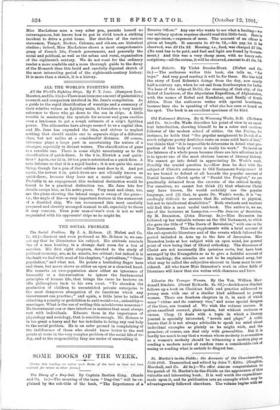Old Testament History. By G. Woosung Wade, D.D. (Methuen and
Co. 6s.)—Dr. Wade describes his point of view in an excel- lent introduction, showing himself to be a sober and cautions follower of the modern school of critics. On the Psalms, for instance, he holds that "the popular assignment to David of so much religious poetry doubtless rests on some solid basis of fact," but thinks that " it is impossible to determine in detail what pro- portion of this body of verse is really his work." To insist on the lateness of a whole poem because there are late allusions in it is to ignore one of the most obvious lessons of literary history. We cannot go into detail in appreciating Dr. Wade's work. Possibly the crucial question is,—How does he deal with the subject of Christ's references to Old Testament Scriptures ? If we are bound to defend at all hazards the popular account of Daniel because Christ spoke of "Daniel the Prophet," we are practically debarred from the exercise of the critical faculty. For ourselves, we cannot but think (1) that whatever Christ may have known, He would certainly use the popular language, and (2) that, to quote Dr. Wade's words, it is "ex- ceedingly difficult to assume that He submitted to physical, but not to intellectual disabilities." Both students and teachers will find this a most useful text-book. The author is, we see, one of the lecturers at Lampeter.—The Sunrise of Revelation. By M. Bramston. (John Murray. 5s.)—Miss Bramston has followed up her valuable volume on the Old Testament, to which she gave the title of "The Dawn of Revelation," with one on the New Testament This she supplements with a brief account of the sub-apostolic literature and of the events which followed the period included in Acts up to the fate of Jerusalem. Miss Bramston looks at her subject with an open mind, her general point of view being that of liberal orthodoxy. The discourses of Christ are not necessarily His ipsissima verba, but have been arranged by the Evangelists so as to give a faithful account of His teaching; the miracles are not to be explained away, but what may'be called the subjective element in them must be con- sidered. All who knoiv Miss Bramston's work in other fields of literature will know that she writes with clearness and force.














































 Previous page
Previous page